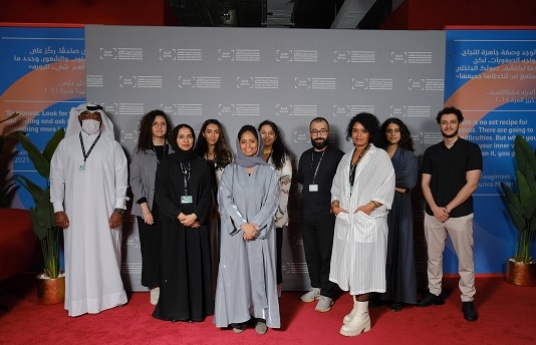Filmmakers in Qatar highlight role of Qumra in building a strong national film and creative industry
Mar 12, 2023

Doha, Qatar; March 12, 2023: Filmmakers in Qatar, both nationals and those who call the country home, have highlighted the role of Qumra, the annual industry incubator event by the Doha Film Institute, in building a strong national film and creative industry that enables them to fulfil their cinematic aspirations as well as take their projects to a global audience.
Qumra 2023 is nurturing 13 homegrown projects by filmmakers in Qatar, including features and short films. Seven of these films are by Qatari nationals. Over 200 industry professionals, including five eminent Qumra Masters are supporting their script-to-screen journey through in-person meetings, workshops, and masterclasses.
At a media briefing, the filmmakers said the Doha Film Institute serves as a crucial resource that enables them to understand more about the entire film ecosystem – from scripting to financing, production, post-production, marketing, distribution and showcasing their films at international film festivals.
Mohammed A. Al-Suwaidi, director of Alaqiq: Darkness of Media (Qatar) said his project, supported by the Qatari Film Fund, is distinctive in content and style. The film is codirected by Kummam Al Maadeed and is set in a city warped by social media and technology. After a brutal attack against his grandfather, Aqiq discovers he is the first in a new generation of a superhero group called ‘The Guardians.’ “The main challenge we face is in presenting the superheroes, usually depicted in a Western format, in a Qatari and Arab style. We succeeded in presenting them in a way that connects with local audiences.”
Kummam Al Maadeed said the film deals with a very important topic – social media – using superhero characters to explore solutions. She said her skills in writing stories helped her cut a pathway in films and is focused on creating a project with a local flavour.
Dhoha Abdelsattar, director of Missed Connections [working title] (Qatar), about a married couple repeatedly trying and failing to connect emotionally, said: “Making a film is not easy; you have to sacrifice your personal life and social life to focus on your project. The Doha Film Institute’s mentorship is invaluable as it enables us to meet our peers and engage in creative discussions that are enriching. In return, we give our energy, dedication and commitment to our projects.”
Nadia Al-Khater, who is directing Continuity [working title] (Qatar) is about a young woman who discovers that she is editing her own life while working on a new project, says Qumra has been important for her in receiving feedback from mentors. “Many film festivals have specific priorities and gaining an understanding of what is relevant and cutting edge in cinema is important to me as a filmmaker as we want to create a film that is original and fresh.” She said the Doha Film Institute has helped create an ecosystem whereby there is abundance of local content from the region. “We are making our own films, we are making our own content, and we are writing our own stories.”
Eiman Mirghani, the director of Villa 187 (Sudan, Qatar), is participating in Qumra for the third year. “The Doha Film Institute is like family to me, and I have been participating in several workshops over the past six years. Their support has opened my eyes to many aspects regarding filmmaking, such as grants and connecting to organisations that help directors develop their craft. I believe that the work done by the institutes is a crucial resource for filmmakers from across the world. And Qumra is important for young talent as it provides mentors who could help in film funding as well as the entire processes in filmmaking.” Mirghani’s film documents her family’s house — and the memories that made it a home—for over 30 years.
Obada Jarbi, director of Bel Falstini (Lebanon, Qatar) said Qumra has opened new horizons and helps him expand his thinking to explore new ideas and make the film more compelling. His project is about Palestinian refugees in the Shatila Refugee Camp in Lebanon. It focuses on the history of its people, the burden of their hope, and how the tension created by the two affects the lives of the different generations of Palestinians living in the camp.
The Myth of Mahmoud (Palestine, Qatar) by Mayar Hamdan is about Mahmoud Said, a Palestinian man who died at 93 years old after attempting to build a home. “The film explores the Palestinian identity in-depth and is a message about instability with a metaphor of the philosophy of absurdism. DFI has a significant role in supporting us, spreading our messages and help our cause reach a wider audience.”
This I Remember (Qatar, Lebanon) by Alessandra El Chanti is about a young woman who pieces together her memories of the city she was never able to call her home—Beirut. Through the film, El Chanti says, she is trying to discover her Lebanese identity although she hasn’t lived in her homeland at all. “In recent years, I made films that address similar topics. I continue to explore the Lebanese identity, which is an imagined one about our people who live outside their borders. DFI’s support is crucial to us to emerge and thrive, and Qumra is an important platform for me to develop and pursue my career in filmmaking.”
Karim Emara, the director of Holy Feet (USA, Egypt, Qatar), about a lady forced into a difficult situation to save her ailing husband, said, “Qumra not only helps filmmakers in gaining feedback on your script as well as opens opportunities for financing and production support, but also helps in developing connections. We are creating a hub and a family; even though I reside in America I can always connect with them.”